Comparative Analysis: Financial Accounting and Management Accounting
VerifiedAdded on 2023/01/11
|6
|1335
|28
Essay
AI Summary
This essay provides a detailed comparison of financial and management accounting, highlighting their distinct characteristics, objectives, and target users. Financial accounting, focused on external reporting, adheres to regulatory guidelines and provides verifiable data in financial statements like balance sheets and income statements for stakeholders such as investors and creditors. Management accounting, on the other hand, caters to internal decision-making, offering both financial and non-financial information to managers. The essay elucidates how management accounting reports are flexible, timely, and confidential, aiding in strategic planning and operational control. It emphasizes that both accounting types, though different in approach and application, are crucial for informed decision-making, driving organizational success by providing relevant insights to their respective users.

Business Finance
Paraphrase This Document
Need a fresh take? Get an instant paraphrase of this document with our AI Paraphraser
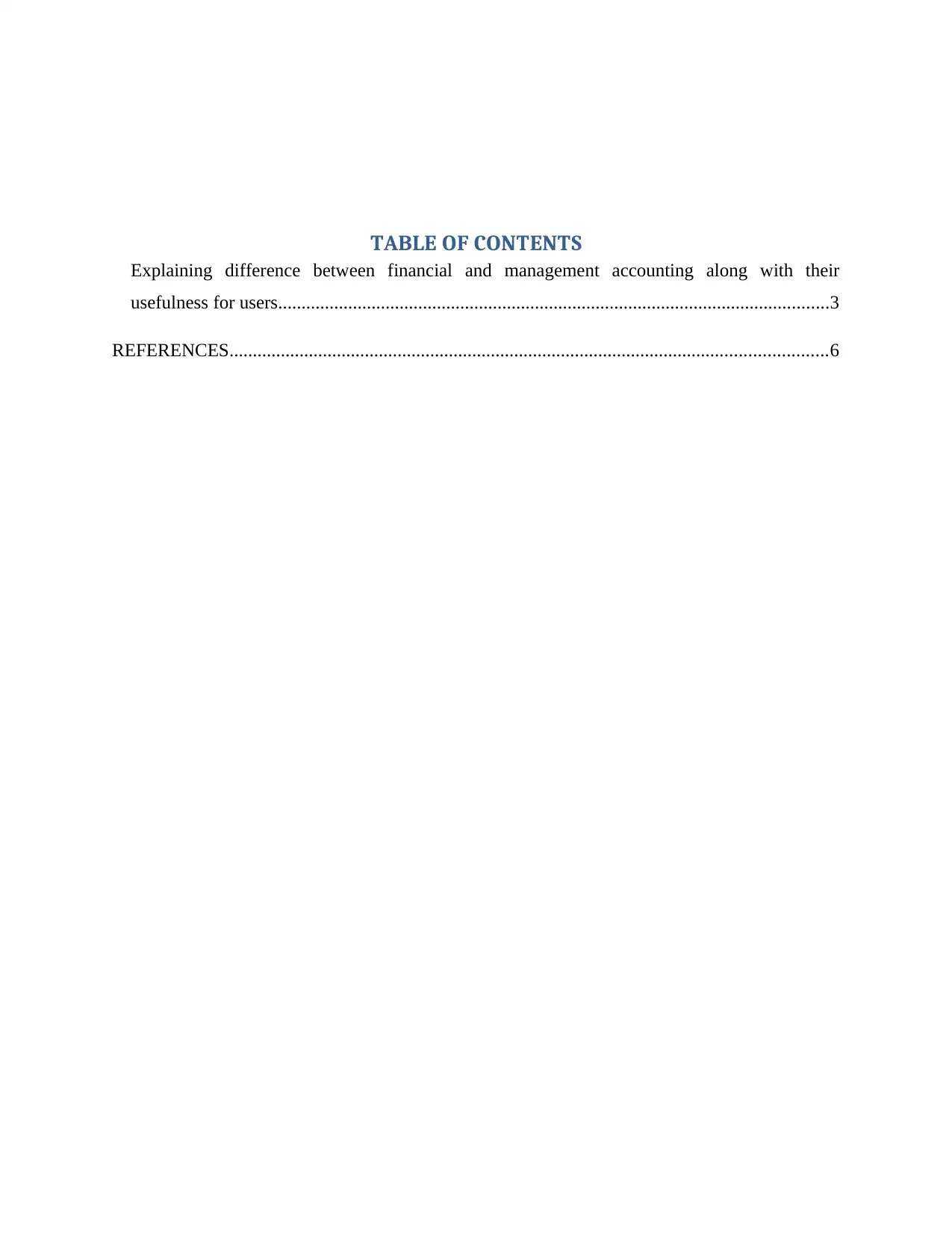
TABLE OF CONTENTS
Explaining difference between financial and management accounting along with their
usefulness for users......................................................................................................................3
REFERENCES................................................................................................................................6
Explaining difference between financial and management accounting along with their
usefulness for users......................................................................................................................3
REFERENCES................................................................................................................................6
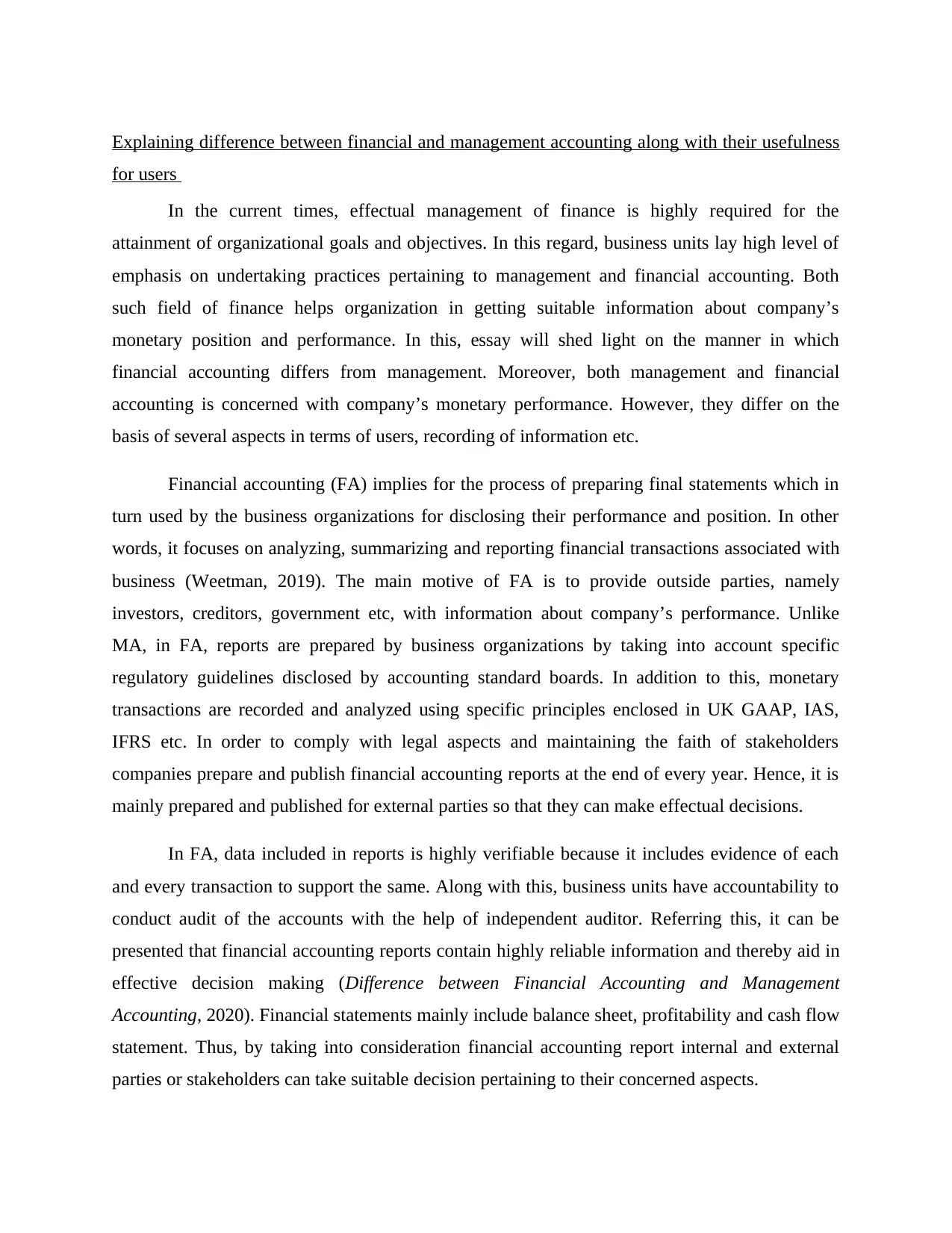
Explaining difference between financial and management accounting along with their usefulness
for users
In the current times, effectual management of finance is highly required for the
attainment of organizational goals and objectives. In this regard, business units lay high level of
emphasis on undertaking practices pertaining to management and financial accounting. Both
such field of finance helps organization in getting suitable information about company’s
monetary position and performance. In this, essay will shed light on the manner in which
financial accounting differs from management. Moreover, both management and financial
accounting is concerned with company’s monetary performance. However, they differ on the
basis of several aspects in terms of users, recording of information etc.
Financial accounting (FA) implies for the process of preparing final statements which in
turn used by the business organizations for disclosing their performance and position. In other
words, it focuses on analyzing, summarizing and reporting financial transactions associated with
business (Weetman, 2019). The main motive of FA is to provide outside parties, namely
investors, creditors, government etc, with information about company’s performance. Unlike
MA, in FA, reports are prepared by business organizations by taking into account specific
regulatory guidelines disclosed by accounting standard boards. In addition to this, monetary
transactions are recorded and analyzed using specific principles enclosed in UK GAAP, IAS,
IFRS etc. In order to comply with legal aspects and maintaining the faith of stakeholders
companies prepare and publish financial accounting reports at the end of every year. Hence, it is
mainly prepared and published for external parties so that they can make effectual decisions.
In FA, data included in reports is highly verifiable because it includes evidence of each
and every transaction to support the same. Along with this, business units have accountability to
conduct audit of the accounts with the help of independent auditor. Referring this, it can be
presented that financial accounting reports contain highly reliable information and thereby aid in
effective decision making (Difference between Financial Accounting and Management
Accounting, 2020). Financial statements mainly include balance sheet, profitability and cash flow
statement. Thus, by taking into consideration financial accounting report internal and external
parties or stakeholders can take suitable decision pertaining to their concerned aspects.
for users
In the current times, effectual management of finance is highly required for the
attainment of organizational goals and objectives. In this regard, business units lay high level of
emphasis on undertaking practices pertaining to management and financial accounting. Both
such field of finance helps organization in getting suitable information about company’s
monetary position and performance. In this, essay will shed light on the manner in which
financial accounting differs from management. Moreover, both management and financial
accounting is concerned with company’s monetary performance. However, they differ on the
basis of several aspects in terms of users, recording of information etc.
Financial accounting (FA) implies for the process of preparing final statements which in
turn used by the business organizations for disclosing their performance and position. In other
words, it focuses on analyzing, summarizing and reporting financial transactions associated with
business (Weetman, 2019). The main motive of FA is to provide outside parties, namely
investors, creditors, government etc, with information about company’s performance. Unlike
MA, in FA, reports are prepared by business organizations by taking into account specific
regulatory guidelines disclosed by accounting standard boards. In addition to this, monetary
transactions are recorded and analyzed using specific principles enclosed in UK GAAP, IAS,
IFRS etc. In order to comply with legal aspects and maintaining the faith of stakeholders
companies prepare and publish financial accounting reports at the end of every year. Hence, it is
mainly prepared and published for external parties so that they can make effectual decisions.
In FA, data included in reports is highly verifiable because it includes evidence of each
and every transaction to support the same. Along with this, business units have accountability to
conduct audit of the accounts with the help of independent auditor. Referring this, it can be
presented that financial accounting reports contain highly reliable information and thereby aid in
effective decision making (Difference between Financial Accounting and Management
Accounting, 2020). Financial statements mainly include balance sheet, profitability and cash flow
statement. Thus, by taking into consideration financial accounting report internal and external
parties or stakeholders can take suitable decision pertaining to their concerned aspects.
⊘ This is a preview!⊘
Do you want full access?
Subscribe today to unlock all pages.

Trusted by 1+ million students worldwide
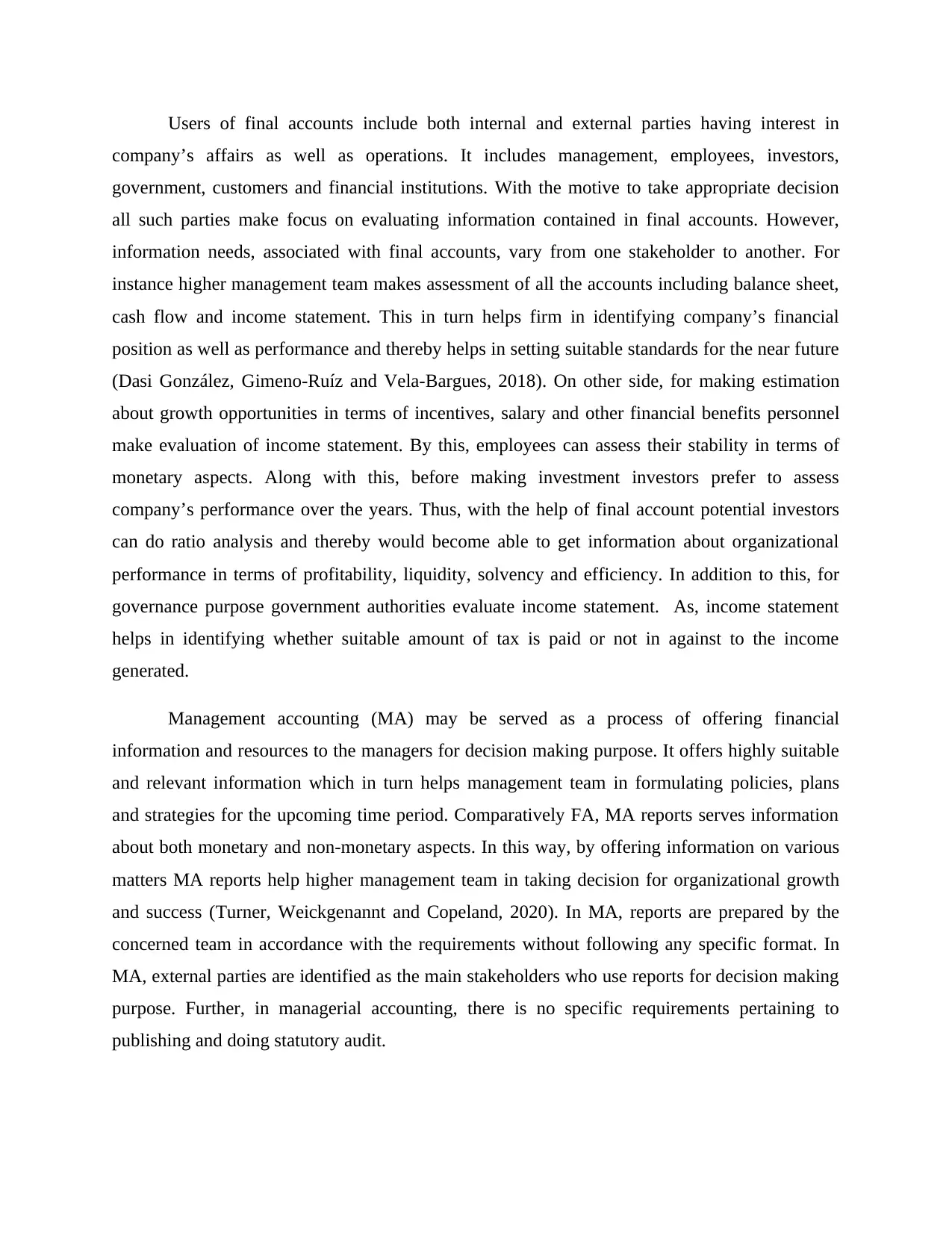
Users of final accounts include both internal and external parties having interest in
company’s affairs as well as operations. It includes management, employees, investors,
government, customers and financial institutions. With the motive to take appropriate decision
all such parties make focus on evaluating information contained in final accounts. However,
information needs, associated with final accounts, vary from one stakeholder to another. For
instance higher management team makes assessment of all the accounts including balance sheet,
cash flow and income statement. This in turn helps firm in identifying company’s financial
position as well as performance and thereby helps in setting suitable standards for the near future
(Dasi González, Gimeno-Ruíz and Vela-Bargues, 2018). On other side, for making estimation
about growth opportunities in terms of incentives, salary and other financial benefits personnel
make evaluation of income statement. By this, employees can assess their stability in terms of
monetary aspects. Along with this, before making investment investors prefer to assess
company’s performance over the years. Thus, with the help of final account potential investors
can do ratio analysis and thereby would become able to get information about organizational
performance in terms of profitability, liquidity, solvency and efficiency. In addition to this, for
governance purpose government authorities evaluate income statement. As, income statement
helps in identifying whether suitable amount of tax is paid or not in against to the income
generated.
Management accounting (MA) may be served as a process of offering financial
information and resources to the managers for decision making purpose. It offers highly suitable
and relevant information which in turn helps management team in formulating policies, plans
and strategies for the upcoming time period. Comparatively FA, MA reports serves information
about both monetary and non-monetary aspects. In this way, by offering information on various
matters MA reports help higher management team in taking decision for organizational growth
and success (Turner, Weickgenannt and Copeland, 2020). In MA, reports are prepared by the
concerned team in accordance with the requirements without following any specific format. In
MA, external parties are identified as the main stakeholders who use reports for decision making
purpose. Further, in managerial accounting, there is no specific requirements pertaining to
publishing and doing statutory audit.
company’s affairs as well as operations. It includes management, employees, investors,
government, customers and financial institutions. With the motive to take appropriate decision
all such parties make focus on evaluating information contained in final accounts. However,
information needs, associated with final accounts, vary from one stakeholder to another. For
instance higher management team makes assessment of all the accounts including balance sheet,
cash flow and income statement. This in turn helps firm in identifying company’s financial
position as well as performance and thereby helps in setting suitable standards for the near future
(Dasi González, Gimeno-Ruíz and Vela-Bargues, 2018). On other side, for making estimation
about growth opportunities in terms of incentives, salary and other financial benefits personnel
make evaluation of income statement. By this, employees can assess their stability in terms of
monetary aspects. Along with this, before making investment investors prefer to assess
company’s performance over the years. Thus, with the help of final account potential investors
can do ratio analysis and thereby would become able to get information about organizational
performance in terms of profitability, liquidity, solvency and efficiency. In addition to this, for
governance purpose government authorities evaluate income statement. As, income statement
helps in identifying whether suitable amount of tax is paid or not in against to the income
generated.
Management accounting (MA) may be served as a process of offering financial
information and resources to the managers for decision making purpose. It offers highly suitable
and relevant information which in turn helps management team in formulating policies, plans
and strategies for the upcoming time period. Comparatively FA, MA reports serves information
about both monetary and non-monetary aspects. In this way, by offering information on various
matters MA reports help higher management team in taking decision for organizational growth
and success (Turner, Weickgenannt and Copeland, 2020). In MA, reports are prepared by the
concerned team in accordance with the requirements without following any specific format. In
MA, external parties are identified as the main stakeholders who use reports for decision making
purpose. Further, in managerial accounting, there is no specific requirements pertaining to
publishing and doing statutory audit.
Paraphrase This Document
Need a fresh take? Get an instant paraphrase of this document with our AI Paraphraser
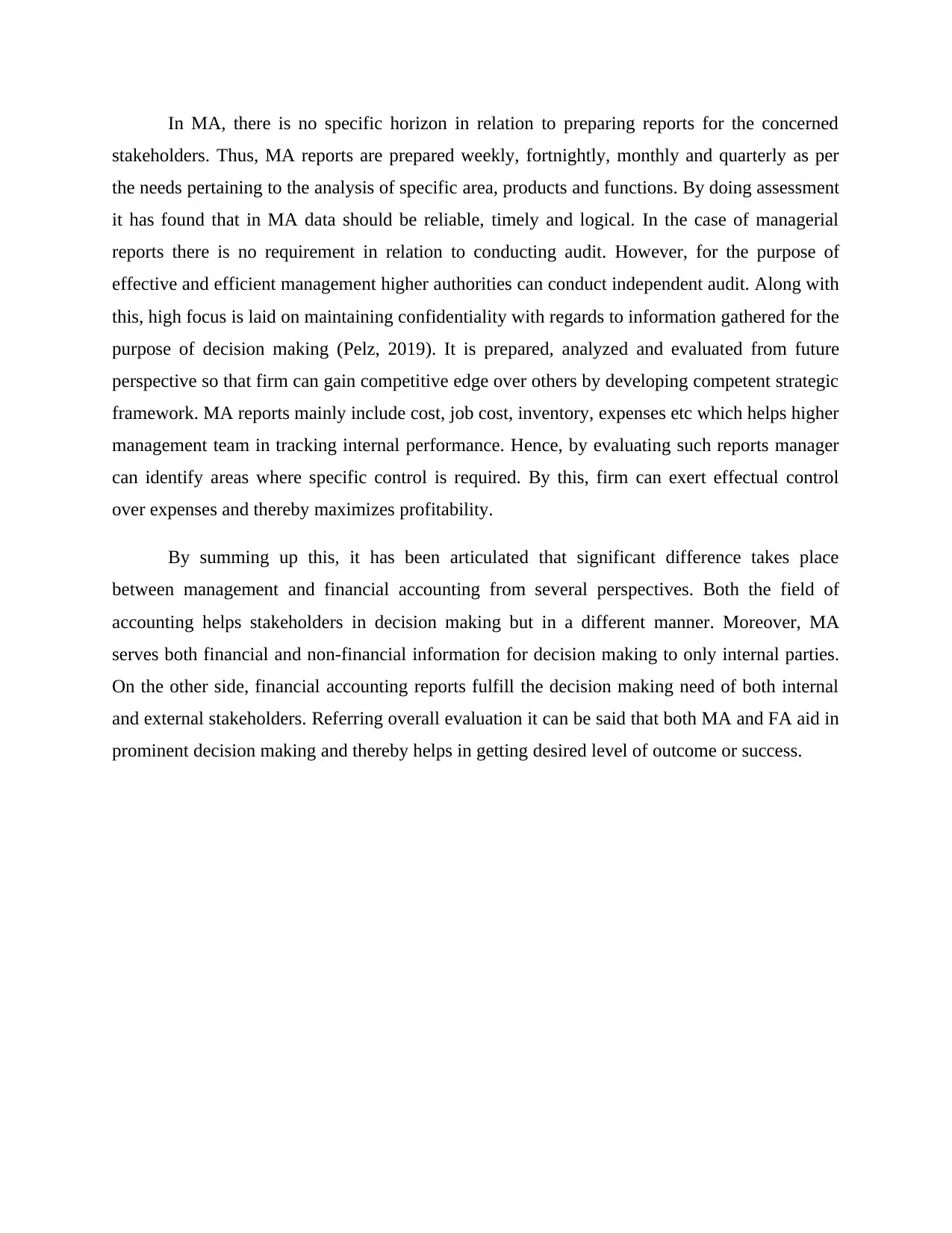
In MA, there is no specific horizon in relation to preparing reports for the concerned
stakeholders. Thus, MA reports are prepared weekly, fortnightly, monthly and quarterly as per
the needs pertaining to the analysis of specific area, products and functions. By doing assessment
it has found that in MA data should be reliable, timely and logical. In the case of managerial
reports there is no requirement in relation to conducting audit. However, for the purpose of
effective and efficient management higher authorities can conduct independent audit. Along with
this, high focus is laid on maintaining confidentiality with regards to information gathered for the
purpose of decision making (Pelz, 2019). It is prepared, analyzed and evaluated from future
perspective so that firm can gain competitive edge over others by developing competent strategic
framework. MA reports mainly include cost, job cost, inventory, expenses etc which helps higher
management team in tracking internal performance. Hence, by evaluating such reports manager
can identify areas where specific control is required. By this, firm can exert effectual control
over expenses and thereby maximizes profitability.
By summing up this, it has been articulated that significant difference takes place
between management and financial accounting from several perspectives. Both the field of
accounting helps stakeholders in decision making but in a different manner. Moreover, MA
serves both financial and non-financial information for decision making to only internal parties.
On the other side, financial accounting reports fulfill the decision making need of both internal
and external stakeholders. Referring overall evaluation it can be said that both MA and FA aid in
prominent decision making and thereby helps in getting desired level of outcome or success.
stakeholders. Thus, MA reports are prepared weekly, fortnightly, monthly and quarterly as per
the needs pertaining to the analysis of specific area, products and functions. By doing assessment
it has found that in MA data should be reliable, timely and logical. In the case of managerial
reports there is no requirement in relation to conducting audit. However, for the purpose of
effective and efficient management higher authorities can conduct independent audit. Along with
this, high focus is laid on maintaining confidentiality with regards to information gathered for the
purpose of decision making (Pelz, 2019). It is prepared, analyzed and evaluated from future
perspective so that firm can gain competitive edge over others by developing competent strategic
framework. MA reports mainly include cost, job cost, inventory, expenses etc which helps higher
management team in tracking internal performance. Hence, by evaluating such reports manager
can identify areas where specific control is required. By this, firm can exert effectual control
over expenses and thereby maximizes profitability.
By summing up this, it has been articulated that significant difference takes place
between management and financial accounting from several perspectives. Both the field of
accounting helps stakeholders in decision making but in a different manner. Moreover, MA
serves both financial and non-financial information for decision making to only internal parties.
On the other side, financial accounting reports fulfill the decision making need of both internal
and external stakeholders. Referring overall evaluation it can be said that both MA and FA aid in
prominent decision making and thereby helps in getting desired level of outcome or success.
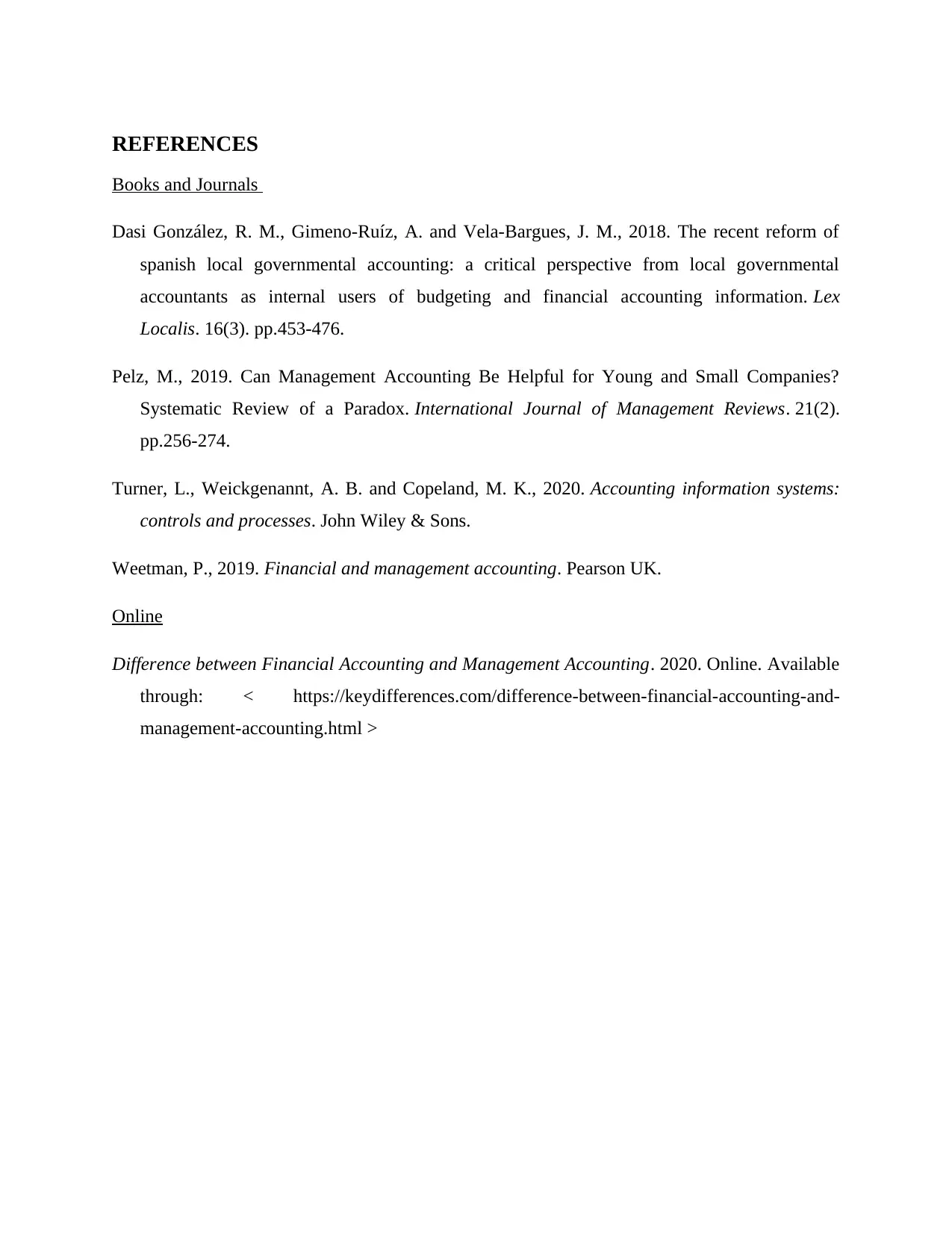
REFERENCES
Books and Journals
Dasi González, R. M., Gimeno-Ruíz, A. and Vela-Bargues, J. M., 2018. The recent reform of
spanish local governmental accounting: a critical perspective from local governmental
accountants as internal users of budgeting and financial accounting information. Lex
Localis. 16(3). pp.453-476.
Pelz, M., 2019. Can Management Accounting Be Helpful for Young and Small Companies?
Systematic Review of a Paradox. International Journal of Management Reviews. 21(2).
pp.256-274.
Turner, L., Weickgenannt, A. B. and Copeland, M. K., 2020. Accounting information systems:
controls and processes. John Wiley & Sons.
Weetman, P., 2019. Financial and management accounting. Pearson UK.
Online
Difference between Financial Accounting and Management Accounting. 2020. Online. Available
through: < https://keydifferences.com/difference-between-financial-accounting-and-
management-accounting.html >
Books and Journals
Dasi González, R. M., Gimeno-Ruíz, A. and Vela-Bargues, J. M., 2018. The recent reform of
spanish local governmental accounting: a critical perspective from local governmental
accountants as internal users of budgeting and financial accounting information. Lex
Localis. 16(3). pp.453-476.
Pelz, M., 2019. Can Management Accounting Be Helpful for Young and Small Companies?
Systematic Review of a Paradox. International Journal of Management Reviews. 21(2).
pp.256-274.
Turner, L., Weickgenannt, A. B. and Copeland, M. K., 2020. Accounting information systems:
controls and processes. John Wiley & Sons.
Weetman, P., 2019. Financial and management accounting. Pearson UK.
Online
Difference between Financial Accounting and Management Accounting. 2020. Online. Available
through: < https://keydifferences.com/difference-between-financial-accounting-and-
management-accounting.html >
⊘ This is a preview!⊘
Do you want full access?
Subscribe today to unlock all pages.

Trusted by 1+ million students worldwide
1 out of 6
Related Documents
Your All-in-One AI-Powered Toolkit for Academic Success.
+13062052269
info@desklib.com
Available 24*7 on WhatsApp / Email
![[object Object]](/_next/static/media/star-bottom.7253800d.svg)
Unlock your academic potential
Copyright © 2020–2026 A2Z Services. All Rights Reserved. Developed and managed by ZUCOL.





